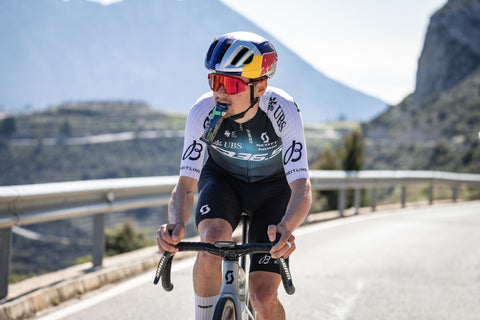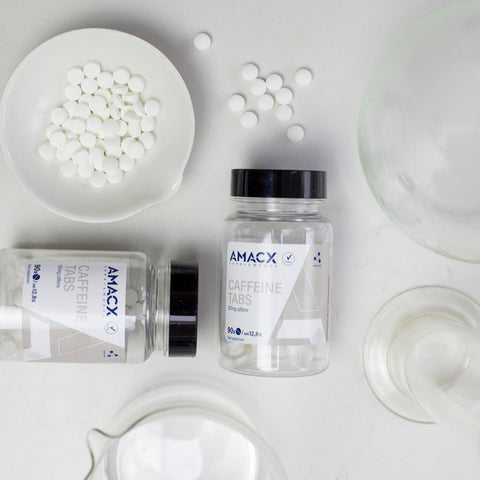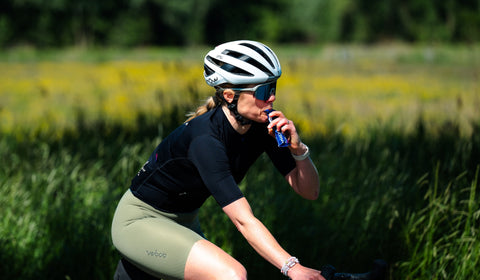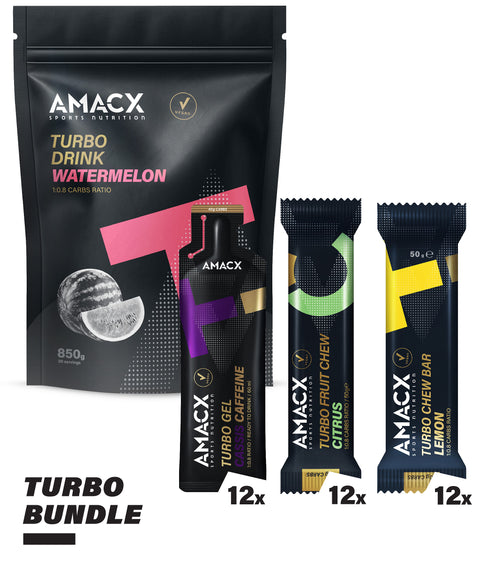Whether you are an aspiring recreational athlete, or play sports professionally: strong muscles and bones are essential for an athlete. But that the gastrointestinal system also plays a crucial role in achieving top performance is somewhat less obvious. After his well-known intestinal problems at the 2017 Giro d'Italia, Tom Dumoulin can speak on this subject. With him, however, there will be many who have ever had to cancel a training session or race due to gastrointestinal problems. What causes such complaints? Are you perhaps eating too much? Or are you choosing the wrong products? And above all, are your stomach and intestines trained enough to handle the quantities and specific bars, gels or sports drinks you plan to consume during the moment suprême?
Summary:
- Gastrointestinal discomfort during exercise can have several causes. For example, it may be due to improper composition of the last meal before the start of exercise, or improper timing of intake prior to exercise.
- A correct competition nutrition plan with the right sports nutrition products can also greatly reduce the risk of gastrointestinal complaints.
- In particular, in order to properly tolerate higher carbohydrate and fluid intakes during exercise, it is crucial to regularly train a competition nutrition plan. This is because the gastrointestinal system is highly trainable, so in this way you reduce the risk of complaints to an absolute minimum.
- This gastrointestinal training is best carried out over a period of 6 to 10 weeks leading up to a major goal. During this period you gradually increase your intake to the intended carbohydrate target (e.g. 60, 90 or 120 grams per hour) via products that you also plan to use during the actual race.
The impact of exercise on digestion
Stomach or intestinal complaints during exercise can have several causes. For example, it can be due to eating a meal too soon before exercise. During exercise, the need for blood in the muscles grows enormously to supply oxygen and energy. This automatically means that blood circulation to other organs is reduced, so the stomach and intestines also receive less oxygenated blood. The more intense the exercise: the more blood needs to be directed toward the muscles. Reduced blood flow to these organs causes the digestion and absorption of a meal or snack to be slower and more difficult. Shaking up and down the various organs also increases the risk of abdominal pain during exercise. For this reason, runners (in whom the upper body moves relatively a lot) are much more likely to suffer from symptoms such as bloating, gas, belching, abdominal cramps or diarrhea.
Choose easily digestible meals and pay attention to timing
Prior to a workout or competition, it is therefore recommended that you choose light-digestible meals. You can do this by choosing carbohydrate-rich products that are relatively low in fats and fiber. These two nutrients in particular slow down the digestion and absorption of a meal. Therefore, choose, for example, white rice or pasta with a light sauce and limited amount of vegetables, or white bread with some jam, honey or apple syrup. In addition, be economical with the amount of protein-rich products (meat, fish, eggs, dairy, legumes, etc.). In addition to the composition of this meal, pay attention to the timing of intake. Digesting a full meal takes at least 2 to 3 hours, so definitely aim for this time between the last meal and the start of the workout as well. Additionally, keep in mind that some people will need a little longer to experience no symptoms. If you only take a smaller snack before exercise, try to do so about 1 hour before the start.
Train your gastrointestinal system for maximum carbohydrate absorption
It is no longer a secret that the proper intake of carbohydrates and fluids during a long endurance exercise is very important for good performance. In the previous blogs, you were able to read which carbohydrates are best suited during your exercise, and also how much of these you need to perform optimally. For top performance in the longest and toughest efforts, very high carbohydrate intakes are necessary: up to 90 to 120 grams per hour. However, no one is directly able to absorb these amounts hour-after-hour into the body without any problems, especially during heavy exercise. Fortunately, the gastrointestinal system, like our muscles, for example, is highly trainable and thus we can get better at absorbing all the necessary nutrients.
Optimal nutritional choices during training and competition
To make this even easier, also during your training or competition choose products that can be digested quickly and easily. This can be achieved through both solid (e.g. energy bars) and liquid foods (sports drinks and energy gels): the combination of products that works best for you is mainly a matter of personal preference. Liquid products contain only rapidly absorbable carbohydrates and a small amount of salt. This poses minimal stress on the stomach and intestines, but at the same time does not offer a "full feeling. Therefore, sports drinks and energy gels are especially recommended during the most intense efforts, and during sports where the risk of gastrointestinal distress is high anyway (such as running). Energy bars deliver the energy gradually and provide a slightly fuller feeling in the stomach. Thus, especially during gentle workouts, this can be a pleasant choice. Even more important is to find the combination of products that you like and tolerate best.
Optimize your performance
To get better and better at absorbing large amounts of carbohydrates and fluids, which is indispensable for peak performance, it is very important to regularly train your competition nutrition plan. Doing this regularly not only increases the tolerance of your stomach and intestines (preventing you from experiencing symptoms), but improves the speed at which sports nutrition passes through your stomach and increases absorption in the intestines. Several scientific studies show that the transport systems on the intestinal wall that are responsible for the absorption of carbohydrates (glucose and fructose) increase in number when predominantly carbohydrate-rich food is consumed for a longer period of time. Thus, this effectively puts more energy into the body, and also makes the muscles better at using larger amounts of carbohydrates as an energy source. All of these steps ultimately provide direct performance gains.
Train a high carbohydrate intake once a week
Specifically, it is therefore advisable to start training your stomach and intestines over a period of 6 to 10 weeks leading up to an important event. You do this by achieving a high carbohydrate intake once a week via products that you also plan to take during your actual race. Try to do this in one of the longest workouts of the week, and/or the workout with the most race specific intensity. Do not aim for the maximum intake right away (for example 90 or 120 grams of carbohydrates per hour), but build it up gradually week by week (for example, every week 5 or 10 grams of carbohydrates per hour extra). While doing this, also don't forget to include the other things in your race nutrition plan (such as adequate fluid intake).












